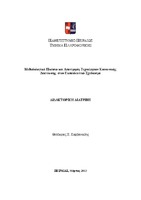Μεθοδολογικό πλαίσιο και αποτίμηση τεχνολογιών κοινωνικής δικτύωσης στον εκπαιδευτικό σχεδιασμό
Methodological framework and evaluation of social networking technologies in the educational design

View/
Subject
Online social networks ; Τεχνολογία -- Κοινωνικές απόψεις ; Διαδίκτυο (Internet) στην εκπαίδευσηAbstract
This work investigates the incorporation of Web 2.0 technologies in higher education. We propose i-SERF (integrated-Self Evaluated and Regulated Framework), an integrated framework which facilitates synchronous and asynchronous education using several Web 2.0 tools. This framework is a two-layered framework that incorporates in the first layer a partnership of the Web 2.0 technologies, pedagogy and content and a self-evaluating, self-fed regulation mechanism in its second layer. This mechanism is based on the students’ performance, on their behaviour over the online medium at which the educational process is held and on their level of satisfaction. In order to obtain a fuller understanding of the impact of Web 2.0 technologies on university students’ learning process driven by the i-SERF framework and the effectiveness of the i-SERF itself in adding value to students’ learning process, a pilot implementation has been held within a university IT course lifetime and assessed from various angles. The pilot implementation, combined with a thorough assessment that utilizes advanced statistical tools, has revealed significant correlations and interdependencies on the students’ behavior over the used platform and their performance in various time-points within the course time line. The students’ performance has been detected to be directly affected by the frequency of their interactions with the electronic medium (platform), at which the educational process has been carried out. Moreover, the students’ performance is directly affected by the infrastructure and support factor and indirectly by a group of factors, which impact each other. The enhancement of student interest and experience factor and the completeness of the educational approach one have been found to be positively correlated, stressing the importance of the operability of a Web 2.0 driven educational framework. Finally, the completeness of the educational approach factor has been found to have a positive correlation with technology as educational reinforcement stressing the importance of the proper utilization of the technology in an educational framework. This dissertation offers the needed background for designing Web 2.0 educational platforms that may exhibit continuous improvement functions.


